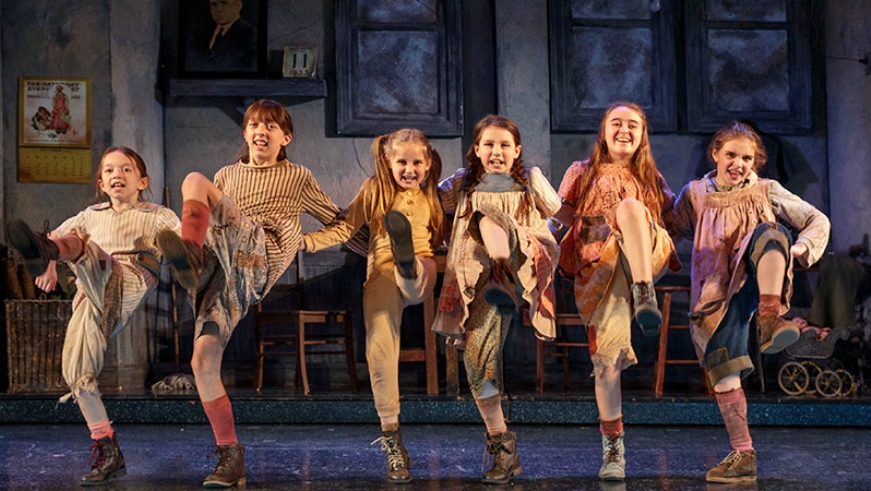‘Annie’ How does one do “Annie” — nice, sweet, sickeningly plucky “Annie” — in self-aware, economically battered and eternally distracted 2014? For better but mostly for worse, the new modernization of “Annie,” starring young “Beasts of the Southern Wild” Oscar nominee Quvenzhane Wallis, embodies all of these qualities. It tries everything: It’s sincerely upbeat yet winkingly post-modern; it addresses the income gap while indulging in “Sex and the City”-style wealth porn. These extremes don’t go together, but in a way, and purely by accident, “Annie” captures the mad, dangerous schizophrenia of our times. If only the musical numbers were any good. The new “Annie” follows the plot of the 1977 Broadway musical and John Huston’s splashy 1982 movie adaptation, sometimes loosely, sometimes mockingly. Wallis’ Annie isn’t stuck in an orphanage but holed up with other girls in the cramped, white-washed Harlem digs of Miss Hannigan (Cameron Diaz), now a bitter welfare queen who never got over getting booted from C+C Music Factory. (Diaz, shrieking through a more-is-more turn, blasts a lot of early ’90s songs for the adults.) Annie winds up living with — and slowly melting the cold heart of — not Daddy Warbucks but Will Stacks (Jamie Foxx), a Bloombergian corporate shark running a wobbly bid for mayor. He needs her to make him look more palatable to the voting masses, especially once she becomes a Twitter sensation. The social media presence doesn’t so much capture the communication ways of our times as wreak of desperation, a flailing need to appeal to the kids — and do kids even watch movies these days? At times it seems to be aiming for a smarter, older audience. It kicks off with a sugar-high little girl with red hair tap-dancing in a classroom. Her name is Annie and she looks like the 1982 film’s star Aileen Quinn, but she’s shuffled off and replaced by “the other Annie.” Later Annie will attend a YA movie parody starring Mila Kunis and Ashton Kutcher as some kind of water people. These are the kinds of jokes peddled by directors/pop culture salvagers Phil Lord and Chris Miller (“21 Jump Street,” “The Lego Movie”). Indeed, “Annie” makes a point of featuring their names as director of this in-film monstrosity — probably the most inside baseball joke of the holiday season, apart from another one here involving Patricia Clarkson. But this “Annie” only sometimes indulges in that brand of humor. Mostly it runs on pep, if a weary, not terribly committed version of it. Wallis does little but beam smiles and bob her head, whether she’s bouncing through a forced “I Think I’m Gonna Like It Here” or anguishing over her lost parents. Little of the emotional complexity she exuded in “Southern Wild” carries over, in part because the film itself is rarely sincere either. It’s as calculated as Stacks’ scheme to milk Annie for votes. It doesn’t want to be grating cheese, and so it aims to hover somewhere just above the material, in hopes that it will seem cool, or as cool as a film of “Annie” could be. But then it keeps giving into the lame. The musical numbers are perfunctory mixes of rote singing and stiff dancing; there’s a lot of swaying arms and forced grinning. When music takes over, a film straining to be down has all the pizzazz of an Up with People production. In a film teeming with shrill overcompensating — none worse than Bobby Cannavale, a terrific actor trying really, really hard to fit in — only Rose Byrne, as Stacks’ assistant (and super-hesitant maybe kind of love interest), manages to squeeze in a couple moments of genuine verve. Foxx escapes alive by not trying much at all, particularly during his big number: a sleepily warbled song about how anyone can become rich like him if only they tried, delivered while he flies over low income neighborhoods in a helicopter. It’s not the most sensitive song choice for these times, and a good chunk of the running time is eaten up by gawking at Stacks’ tricked-out “smart-home” apartment. This “Annie” does make a point of being less anti-poor than the musical and 1982 movie, where the villains were those who dared swindle the super-rich. But what previous little social consciousness there is as insincere as the dance numbers. It captures the current economic mentality anyway, where we lightly acknowledge the income gap while getting distracted by silly nonsense, resulting in things getting worse. There’s so much wrong here that it’salmost not worth pointing out that the Twitter-heavy thriller climax — with a cameo from Katy Perry’s feed — isn’t as charming as the unbelievably ridiculous one that closes the 1982 movie. That had Tim Curry scaling an upright bridge. This one just has people staring at phone screens. Follow Matt Prigge on Twitter @mattprigge
Director: Will Gluck
Stars: Quvenzhane Wallis, Jamie Foxx
Rating: PG
1 Globe (out of 5)
Review: ‘Annie’ is a movie at war with itself

Columbia Pictures

















